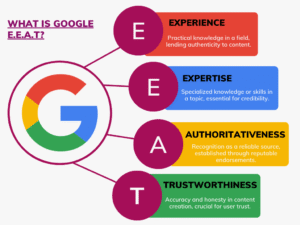You’ve probably heard of E-A-T. It stands for Expertise, Authoritativeness, and Trustworthiness. For years, Google has emphasized the importance of these factors when ranking websites. But now, with AI-generated content becoming mainstream, there’s a new letter in the mix: Experience.
So, what’s really going on with E-E-A-T, and how do you prove you’re not just another AI-generated bot? Here’s the thing—Google isn’t just looking for content that sounds knowledgeable; it’s looking for content that feels human. Let’s dive into what that means and how you can adapt in the age of AI.

What is E-E-A-T, and Why Does it Matter?
E-E-A-T is Google’s way of ensuring that the content it ranks comes from credible, trustworthy sources. But with the rise of AI, things are getting trickier. Now, Google wants to see:
- Experience: Does the author have firsthand experience with the topic?
- Expertise: Is the author truly an expert in the field?
- Authoritativeness: Does the author or website have the authority to speak on the subject?
- Trustworthiness: Can the audience rely on this content to be accurate and honest?
Google is getting better at discerning who is behind the content. AI-generated articles are often great at mimicking human writing, but they lack the deeper context that comes from real-world experience.
The AI Challenge: Can a Machine Have Experience?
Here’s the thing about AI: it’s getting smarter every day, but it still doesn’t have real-world experience. AI doesn’t live in the world. It doesn’t form opinions, test products, or build relationships. It simply processes data.
For example, let’s say you’re writing about a specific type of medical treatment. An AI can churn out a solid, fact-based article about it, but it doesn’t understand the nuances that come from actually being a doctor or patient. Google knows this, and while AI content might be accurate in terms of facts, it’s the experience behind the content that makes it stand out.
This is where you, as a human expert, have an advantage. You can weave in your personal experiences, case studies, or real-world examples—things an AI just can’t replicate.
How to Prove You’re Human (and an Expert)
Now, let’s get into how you can prove to Google that you’re more than just an AI writing assistant. Here are some key strategies:
1. Share Your Personal Experience
When writing content, especially in industries like health, finance, or law, your personal experience matters. Share stories, anecdotes, or examples from your own life that relate to the topic. This could include client testimonials, case studies, or your journey in the industry.
For example, if you’re writing about digital marketing, talk about your own challenges and successes with real campaigns. If you’re in the health space, share personal insights or experiences that show you’ve been in the field, not just researching it online.
2. Show Your Credentials
Google values expertise. Don’t be shy about sharing your qualifications. Whether it’s certifications, degrees, or years of experience, make sure to highlight your credentials clearly. This isn’t just about a bio at the end of your article—integrate it into your content so it feels natural.
For instance, if you’re writing about financial advice, mention your background as a certified financial planner (CFP). If you’re discussing nutrition, talk about your credentials as a registered dietitian (RD).
3. Be Transparent and Authentic
Trustworthiness comes from being transparent. Make it clear when you’ve sourced information from AI tools and when it’s your own expertise shining through. Google and your audience appreciate honesty. If you’ve used an AI tool to help with research or content generation, mention it, but make sure the final product reflects your expert insight.
4. Engage with Your Audience
AI can’t interact the way humans can. Building a community around your content by responding to comments, engaging on social media, or hosting webinars shows Google that you’re not just a faceless writer. You’re an active participant in the conversation.
For example, if you’ve written a blog post about personal finance, respond to readers’ comments and questions in the post or on social media. This shows that you’re engaged and committed to offering real value.
5. Provide Sources and References
E-E-A-T isn’t just about what you say; it’s about where you get your information from. AI can generate content quickly, but it often struggles with validating sources or providing the depth of research that a true expert would bring.
For every piece of content you write, make sure to back up your claims with credible, authoritative sources. Link to well-respected studies, experts in the field, and high-quality references. This helps Google see that your content isn’t just generated by a bot; it’s based on a strong foundation of trusted sources.
How AI Fits into E-E-A-T (And How You Can Work With It)
Let’s not forget, AI isn’t the enemy here. It’s a tool. Used correctly, it can help you research faster, brainstorm ideas, and even draft content. But it’s still your expertise and experience that need to shine through. AI doesn’t replace human knowledge; it can complement it.
By using AI as a tool and not a crutch, you can enhance your content, but also ensure that you’re still the expert who’s driving the conversation. Just like any tool, it’s how you use it that counts.
Final Thoughts:
E-E-A-T is more important than ever in the age of AI. But here’s the thing: Google isn’t looking for robots to take over the search results—it’s looking for real, human expertise. By showcasing your personal experience, sharing your credentials, being transparent, and engaging with your audience, you’ll prove that you’re more than just AI-generated content.
The future of SEO isn’t just about how much content you produce—it’s about proving that you’re a real person with real expertise and real authority. And as long as you stay focused on that, you’ll not only pass Google’s E-E-A-T tests but also build trust with your audience.
